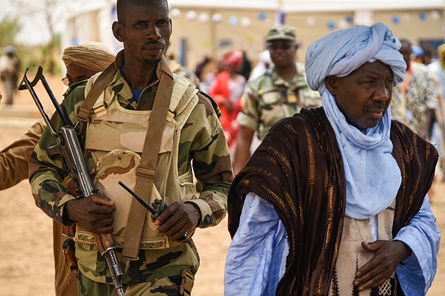Mali
In the wake of what is broadly considered the most disruptive political and security crisis it has faced since independence, Mali is challenged with finding its way back to peace, internal stability, and human security. Despite a context further destabilized by decades of poor governance, some encouraging developments have taken place, including the set-up of consultative security committees and the endorsement of the National SSR Strategy.
DCAF has designed a holistic approach to support both Malian authorities and civilian partners in their efforts to increase accountability and effectiveness of the security sector.
Read our factsheet to get an overview of DCAF's work in Mali in English or French.

Workstreams/Projects
The main objective of DCAF’s programme in Mali is to foster a nationally owned demand for change and accountability. To this end, the consultative security committees offer a unique platform of exchanges between the local government, the security institutions active in the area, and the population represented through a variety of civil society organizations (CSOs).
As part of the first axis of intervention, DCAF is implementing the following activities:
- Supporting the operationalisation of the Consultative Security Committees (CCS) in the regions of San and Bamako (including through the organisation of regular meetings and the support to women and youth representatives).
- Offering strategic advisory services to our institutional partners, with the objective to ensure basic knowledge and acceptance of general good governance principles and methodologies on the one hand, and on the other hand to create an environment favourable to the good management of resources (human and financial) of the security sector.
An effective training and accountability framework is often key to translating laws and the values of people centred security into practice. To this end, DCAF's support to training centres and inspection services is crucial in order to promote the respect of the principles of proportionality and human rights in the actions of security institutions.
As part of the second axis of intervention, DCAF is implementing the following activities:
- Strengthening the accountability of the security sector by building the capacities of internal and external control actors to conduct research, investigations, and analysis of the security sector’s response to specific threats and by supporting the establishment of collaborative mechanisms between those actors.
- Contributing to the professionalisation of the security sector: by developing and updating practical and methodological tools; through the development and revision of training modules to adapt them to local threats; and by improving gender mainstreaming across the institutions’ policies and training curriculum.
A vital area for engagement during transition periods is by creating opportunities for dialogue and informed public discourse, supporting civilian capacity to contribute to and shape the agenda and demand better service delivery and accountability. To this end, DCAF aims to support the creation of a conducive environment and space for communities to learn about their role as actors of the governance of the security sector, raise their issues and demand change.
As part of the third axis of intervention, DCAF is implementing the following activities:
- Building partnerships with independent researchers to produce and share analytical notes on current affaires relevant to the governance of the security sector and identify lessons learned from the implementation of the consultative security committees.
- Working to amplify messages and raise awareness on relevant processes and available services within the security sector by supporting the development of communication and advocacy products and by organising exchange spaces for the media, research centres, civil society organisation and/or security institutions.
Key Resources
Contacts
Anne Bennett, Head of Sub-Saharan Africa Division (a.bennett@dcaf.ch)
Oswald Padonou, Head of Office, DCAF in Mali (o.padonou@dcaf.ch)


